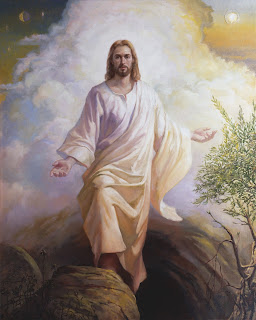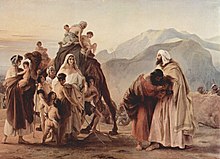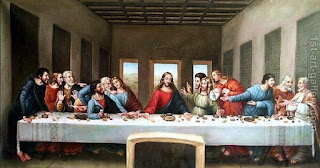This week we finish the book of 2 Nephi, and in so doing say goodbye to the prophet Nephi, son of Lehi. One of my goals this year in my scripture study was to pay attention to mentions of the Savior in the Book of Mormon. If you have been following my blog, you will know that I have been tracking how much Nephi and Lehi knew about Jesus at different times in their lives and travels. When Lehi first saw a vision of God, he saw the Messiah, but didn't know who he was. (1 Nephi 9-10). Gradually, over the next decades, Nephi gradually learned that Jesus would come, suffer for our sins, die, and be resurrected (2 Nephi 11). By the end of his life, Nephi understands the whole "doctrine of Christ". Moreover, he has seen a vision of the future of not only his descendants, but also of the gentiles.
It is interesting that Nephi seems to get this very vital information primarily after his people have separated from the Lamanites. I think we can guess that, by Nephi's death, the Lamanites are still trying, in some way or other, to live the Law of Moses. We know that Nephi took that brass plates with him when he fled from his brothers, so it is possible that by this time they have already strayed from the worship they had experienced in Jerusalem and are now fully integrated in the culture and belief of the native peoples of the promised land. In either case, they probably know very little if anything about Jesus and the atonement. As evidence of this, later when Ammon preaches to the king of the Lamanites, he doesn't have a clue about Christian worship.
Here I have a confession. I also didn't really understand the Doctrine of Christ until recently. Oh sure, I knew that 4th Article of Faith and the first four principles of the Gospel, but when I went to the temple made covenants during the Endowment, I wasn't sure what I was covenanting to when I promised to obey the Law of the Gospel. I cast my mind for a meaning and decided that the Law of the Gospel probably referred to the "higher law" preached in the sermon on the mount. This was not a bad assumption. Jesus did, after all, preach that sermon to both the old and new world saints, so it must have been important. It wasn't until they changed the wording of the Endowment in February 2023 that I found out that the "Law of the Gospel" is the same as the "Doctrine of Christ" explained in the last 3 chapters of 2 Nephi. I admit that it was a bit of a relief. I understand that the Sermon on the Mount was given as much to comfort suffering saints as to encourage them to live a higher standard, but it still sets a pretty high bar for behavior that I knew I was daily falling short of. When I heard the new changes to the Endowment, I thought, "Is that really all it is: faith, repentance, baptism, the gift of the Holy Ghost, obedience to covenants and enduring to the end? I can do that." Of course, those are no small things, but they seem more attainable then never getting angry, or being a light to the world, or plucking out my right eye if it offends me. (Matthew 5: 22-30) So yay for the new changes to the temple ceremony and yay for the last three chapters of 2 Nephi.




















